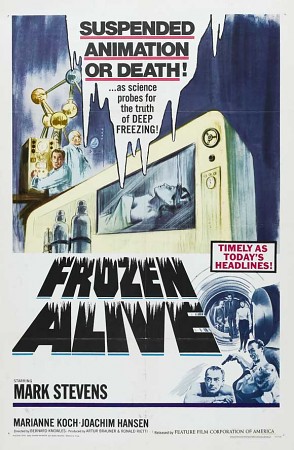
Tucked away in an office park next to Scottsdale Airport, Alcor looks like your average, ambiguous tech company with its gray, windowless facade and manicured shrubbery. But inside, it's a different story. In the back you'll find a concrete vault containing, at last count, about 70 human icicles. That's right. Frozen folks. Mostly heads.
You could call it a sort of tomb, but Alcor's operators would be loath to share that assessment with you. Alcor doesn't see their iced-down residents as dead. They're just at the end of their "first life cycle." Alcor, as far as they see it, is in the business of stretching longevity. In fact, the company's full name is the Alcor Life Extension Foundation.
Admittedly the whole thing may sound like some sort of cult. A frosty fraternity, if you will. After all, they do refer to their customers as "members" and require a months-long legal procedure to join — not to mention one fellow who legally changed his name to "FM-2030" before entering stasis — but the people at Alcor are surprisingly normal. Essentially, they're just scientists embarking on one long, drawn-out experiment.
Now, I'm not saying the whole thing isn't still way up there on the freaky meter, but once you understand what it is they're doing with all those bodies chilling in the back, it isn't quite as lunatic as it sounds. First, dead isn't necessarily dead. In the case of a terminally ill patient, for example, a standby team simply waits until the patient stops breathing and he's pronounced legally dead. They will then jump in and administer cardiopulmonary support, their goal being not to resuscitate the patient, but only to keep his tissues alive until the body can be prepared for freezing.

Secondly, members aren't really frozen, but "vitrified." At Alcor, the word "frozen" is discouraged. Great care is taken not to freeze tissue, as the formation of ice would completely destroy a body's cells and turn a person to oatmeal. Instead, members' fluids are replaced with special ice-inhibiting cryoprotectants, sort of like human preservatives. They're the same compounds being developed to mothball vital bits like hearts and livers in the hopes of creating organ banks.
Once pickled, members are then submerged in liquid nitrogen and kept at a constant temperature of minus 320 degrees Fahrenheit until the day medicine advances far enough that they no longer meet the criteria for legal death, at which point they can be warmed up, resuscitated and cured.
Still, the fact that most members have selected the noggin-only option over the full-body package keeps this place filed under T for trippy. True, head-only storage may be significantly cheaper, but you'd think having to grow a new torso from scratch or purchase a robot chassis when you wake up will offset those savings a tad.
The really great thing about Alcor? They give tours. Anyone interested in cryonic preservation, or who just suffers from an insatiable curiosity, can go to their website and request a walk-through. Just don't expect a lot of sci-fi stasis tubes or panels full of flashy lights and bio-monitor displays. Members are simply stored in what are essentially 10-foot-tall, custom-made thermoses. It's closer to garage medicine than anything, with a fair amount of do-it-yourself apparatus, hand-built as needed. Really, when you think about, it's not a field you can just pick stuff out of a catalog for. Actually, it's probably as close to mad science as you can get. (Explore images at their website.)
Of course, it all comes down to one question in the end: Is it possible to thaw people out and revive them? Well, nobody knows. Members are just placing a sort of Pascal's Wager; if you're frozen and they can't revive you, c'est la vie, but if you're not frozen and they can ... well, hard cheese, you're ashes. To simplify it as one member did for me, "Got nothin' to lose!"



